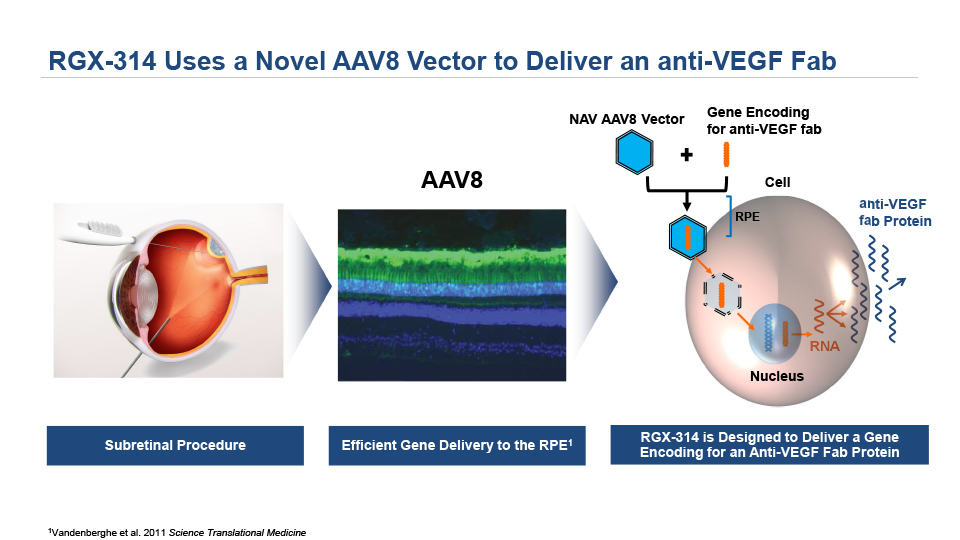Gene therapy for severe wet AMD
Novel subretinal treatment shows promise for disease control with reduction in anti-VEGF injection burden

Cheryl Guttman Krader
Published: Monday, March 1, 2021
 Subretinal RGX-314 gene therapy continues to be well-tolerated and show efficacy for dramatically reducing the anti-VEGF injection burden among patients with severe wet age-related macular degeneration (AMD), according to interim results of an ongoing phase I/IIa clinical trial.
RGX-314 delivers a coding sequence for a soluble anti-VEGF protein using an adeno-associated viral vector. Data from the phase I/IIa dose-escalation study were presented by Robert Avery MD at the EURETINA 2020 Virtual meeting.
Dr Avery reported that therapeutic effects were observed in the three higher dose cohorts and are durable after available follow-up of one-to-two years. The data also show a dose-dependent and stable increase in the expression of RGX-314 protein that does not seem to be affected by pre-existing neutralising antibodies.
“Planning of a pivotal phase III trial of subretinal RGX-314 for wet AMD is under way, and enrolment has begun in a phase II study of RGX-314 for wet AMD with treatment delivery into the suprachoroidal space,” said Dr Avery, private practice, Santa Barbara, CA, USA.
The phase I/IIa dose escalation study enrolled 42 patients across five cohorts and evaluated doses ranging from 3x109 to 2.5x1011 GC/eye. The subretinal injection was delivered following vitrectomy and without any corticosteroid therapy other than standard postperative drops. The 42 participants had a long-standing history of severe wet AMD, having received an average of 33 prior anti-VEGF injections and approximately 10 injections during the 12 months prior to RGX-314 injection.
Safety was evaluated as the primary outcome measure of the phase I/IIa study, and the review showed most adverse events were mild (77%). Many adverse events were transient and expected following vitrectomy, Dr Avery said.
A single serious adverse event considered possibly drug-related occurred. It involved a patient who entered the trial with retinal pigmentary changes and a history of 94 anti-VEGF injections over a period of 12 years. She developed additional retinal pigmentary changes involving the macula and experienced a 25-letter BCVA loss from baseline at week 50.
“The patient’s wet AMD was well-controlled without any need for rescue anti-VEGF treatments during the study period,” he said.
Patients in the two lowest-dose cohorts showed minimal-to-no change in anti-VEGF injection burden but patients in dose cohorts 3 and 4 had a 61-to-62% reduction in the first year, and the injection burden was reduced by 85% compared with the preceding year in the highest dose cohort.
Visual acuity was stable-to-improved over time in dose cohorts 3 and 4. A mean two-letter loss in cohort 5 was attributable to the patient with the serious adverse event.
Robert Avery: bobave@gmail.com
Subretinal RGX-314 gene therapy continues to be well-tolerated and show efficacy for dramatically reducing the anti-VEGF injection burden among patients with severe wet age-related macular degeneration (AMD), according to interim results of an ongoing phase I/IIa clinical trial.
RGX-314 delivers a coding sequence for a soluble anti-VEGF protein using an adeno-associated viral vector. Data from the phase I/IIa dose-escalation study were presented by Robert Avery MD at the EURETINA 2020 Virtual meeting.
Dr Avery reported that therapeutic effects were observed in the three higher dose cohorts and are durable after available follow-up of one-to-two years. The data also show a dose-dependent and stable increase in the expression of RGX-314 protein that does not seem to be affected by pre-existing neutralising antibodies.
“Planning of a pivotal phase III trial of subretinal RGX-314 for wet AMD is under way, and enrolment has begun in a phase II study of RGX-314 for wet AMD with treatment delivery into the suprachoroidal space,” said Dr Avery, private practice, Santa Barbara, CA, USA.
The phase I/IIa dose escalation study enrolled 42 patients across five cohorts and evaluated doses ranging from 3x109 to 2.5x1011 GC/eye. The subretinal injection was delivered following vitrectomy and without any corticosteroid therapy other than standard postperative drops. The 42 participants had a long-standing history of severe wet AMD, having received an average of 33 prior anti-VEGF injections and approximately 10 injections during the 12 months prior to RGX-314 injection.
Safety was evaluated as the primary outcome measure of the phase I/IIa study, and the review showed most adverse events were mild (77%). Many adverse events were transient and expected following vitrectomy, Dr Avery said.
A single serious adverse event considered possibly drug-related occurred. It involved a patient who entered the trial with retinal pigmentary changes and a history of 94 anti-VEGF injections over a period of 12 years. She developed additional retinal pigmentary changes involving the macula and experienced a 25-letter BCVA loss from baseline at week 50.
“The patient’s wet AMD was well-controlled without any need for rescue anti-VEGF treatments during the study period,” he said.
Patients in the two lowest-dose cohorts showed minimal-to-no change in anti-VEGF injection burden but patients in dose cohorts 3 and 4 had a 61-to-62% reduction in the first year, and the injection burden was reduced by 85% compared with the preceding year in the highest dose cohort.
Visual acuity was stable-to-improved over time in dose cohorts 3 and 4. A mean two-letter loss in cohort 5 was attributable to the patient with the serious adverse event.
Robert Avery: bobave@gmail.com